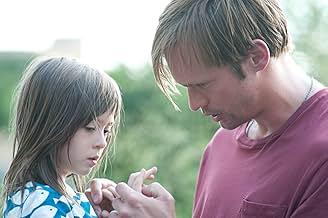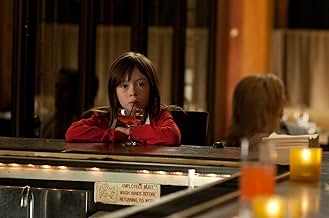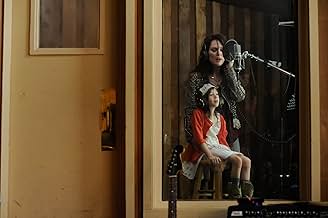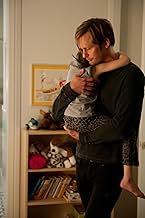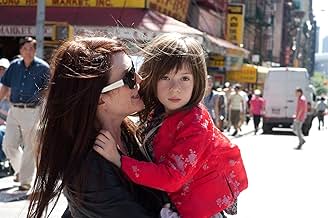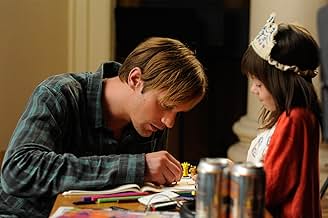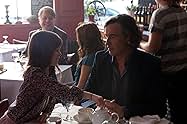AVALIAÇÃO DA IMDb
7,4/10
29 mil
SUA AVALIAÇÃO
Na cidade de Nova York, uma jovem fica no meio da desagradável batalha por custódia de seus pais.Na cidade de Nova York, uma jovem fica no meio da desagradável batalha por custódia de seus pais.Na cidade de Nova York, uma jovem fica no meio da desagradável batalha por custódia de seus pais.
- Direção
- Roteiristas
- Artistas
- Prêmios
- 3 vitórias e 8 indicações no total
Jesse Stone Spadaccini
- Martin
- (as Jesse Spadaccini)
Diana García
- Cecelia
- (as Diana Garcia Soto)
- Direção
- Roteiristas
- Elenco e equipe completos
- Produção, bilheteria e muito mais no IMDbPro
Avaliações em destaque
This movie is a little gem. I read the New York Times review that said it was "Brilliant" or whatever, and I don't know if I'd go that far, but it's definitely the best movie about divorce and child custody I've ever seen, and it's nothing like Kramer vs. Kramer. It's actually really sweet and real feeling, mostly because you really identify with the little girl Maisie. All the adult actors are great, and sometimes funny (Steve Coogan), but I especially loved Alexander Skarsgard. He seems like a loser when you first see him, but he ends up being super loving, and his scenes with Maisie are really fun to watch. Haters are going to hate, but I think anyone would relate to this film about parents, kids, and finding people to love.
I've read five previously posted reviews of this film and see no reason to repeat what they've already said. I agree, for the most part, with the positive ones. And I suspect the negative ones were written by people whose established taste in movies should have steered them away from seeing this one in the first place.
What I'll add is, I guess, a mostly personal perspective. I've found that I am lately much more drawn to smaller, more deeply felt movies than to bigger, slicker, higher-production-value ones. To "What Maisie Knew," for example, than to "The Great Gatsby." Even though both source novels share a similar interior aesthetic, the treatment in the former stays inside the characters, where James focused the original (thus causing one of the previous reviewers' comments to the effect that "nothing happens" in the movie), while the latter (possibly because of Luhrmann's well-established directorial predilections)stays resolutely focused on the exterior spectacle and barely skims the surface of Fitzgerald's deeply rendered characterizations.
If you like smaller, more closely observed and deeply felt films, you'll like this one.
What I'll add is, I guess, a mostly personal perspective. I've found that I am lately much more drawn to smaller, more deeply felt movies than to bigger, slicker, higher-production-value ones. To "What Maisie Knew," for example, than to "The Great Gatsby." Even though both source novels share a similar interior aesthetic, the treatment in the former stays inside the characters, where James focused the original (thus causing one of the previous reviewers' comments to the effect that "nothing happens" in the movie), while the latter (possibly because of Luhrmann's well-established directorial predilections)stays resolutely focused on the exterior spectacle and barely skims the surface of Fitzgerald's deeply rendered characterizations.
If you like smaller, more closely observed and deeply felt films, you'll like this one.
What Maisie Knew (2012)
A truly remarkable movie, filled with great acting, masterful editing and filming, and terrific writing. The basis of it all is the core here, a glimmering Henry James novel by the same title from over 100 years earlier. It's amazing how well the story holds up set in contemporary times, and changed in many necessary (and interesting) ways. What it keeps it going is the basic heartbreaking drama of a child tossed between two indifferent parents.
The mother might be seen as the main actor here, Julianne Moore, and this is the best I've ever seen her, I think. She gives a slightly fiery performance, and "slightly" is perfect, avoiding an overacting job suggested by her role as a slightly successful rock and roll star. She's terrifically awful and you come to hate her, appropriately.
The father (Steve Coogan) also puts in a sharp performance playing the lively, fun parent who is a selfish womanizer, hiding, sometimes, his flaws from his daughter. His relationship with the mother is not detailed very far because it is mostly one of distance and disdain. And mutual abuse.
The real star here is the girl, an utterly charming and beautifully effective actress, Onata, Aprile. She succeeds not by her delivery of great lines, but by her expressions. It's all because Henry James understood something delicate about children in these situations: they know what's going on and don't say it. And they also don't let it affect them because they simply can't afford to, or because they become hardened in some little ways, making them withdraw or act out. That Maisie maintains a delicious sweetness without playing the victim is quite remarkable, and Aprile is brilliant.
The secondary woman and man in the story are also terrific, and their roles grow as the movie grows. In fact, they become the sympathetic heart of things.
Pulling this together is the directing pair, McGehee and Siegel. This is their fifth movie together, and neither man has directed anything without the other. I've not seen any of the other four, but the reviews are middling to poor for all of them, so I'm not sure how far the novelty takes us. But it works here perfectly, making the complexity unfold quickly and coherently.
It's an ordinary drama on the surface, but let this one sink in over time. It's that good.
A truly remarkable movie, filled with great acting, masterful editing and filming, and terrific writing. The basis of it all is the core here, a glimmering Henry James novel by the same title from over 100 years earlier. It's amazing how well the story holds up set in contemporary times, and changed in many necessary (and interesting) ways. What it keeps it going is the basic heartbreaking drama of a child tossed between two indifferent parents.
The mother might be seen as the main actor here, Julianne Moore, and this is the best I've ever seen her, I think. She gives a slightly fiery performance, and "slightly" is perfect, avoiding an overacting job suggested by her role as a slightly successful rock and roll star. She's terrifically awful and you come to hate her, appropriately.
The father (Steve Coogan) also puts in a sharp performance playing the lively, fun parent who is a selfish womanizer, hiding, sometimes, his flaws from his daughter. His relationship with the mother is not detailed very far because it is mostly one of distance and disdain. And mutual abuse.
The real star here is the girl, an utterly charming and beautifully effective actress, Onata, Aprile. She succeeds not by her delivery of great lines, but by her expressions. It's all because Henry James understood something delicate about children in these situations: they know what's going on and don't say it. And they also don't let it affect them because they simply can't afford to, or because they become hardened in some little ways, making them withdraw or act out. That Maisie maintains a delicious sweetness without playing the victim is quite remarkable, and Aprile is brilliant.
The secondary woman and man in the story are also terrific, and their roles grow as the movie grows. In fact, they become the sympathetic heart of things.
Pulling this together is the directing pair, McGehee and Siegel. This is their fifth movie together, and neither man has directed anything without the other. I've not seen any of the other four, but the reviews are middling to poor for all of them, so I'm not sure how far the novelty takes us. But it works here perfectly, making the complexity unfold quickly and coherently.
It's an ordinary drama on the surface, but let this one sink in over time. It's that good.
10Red-125
What Maisie Knew (2012), directed by Scott McGehee and David Siegel, is an extraordinary movie about an extraordinary young girl. Maisie (Onata April) deserves better parents. Both her mother (Julianne Moore) and her father (Steve Coogan) are self-absorbed people who care about Maisie, but care about their careers more than about their daughter.
Maisie is cheerful, cooperative, and adaptive. Although her life has all the trappings of luxury--a nanny, an exclusive private school--she lives in a precarious world. Her parents make only haphazard arrangements for her care. Sometimes these arrangements work, sometimes they don't. Once, the haphazard plans fall through, and Maisie is literally abandoned among strangers. We don't know what will happen next to Maisie, but it probably won't be good. Her parents don't deserve such a great little girl. But, she is their daughter, and she'll have to play the cards she's been dealt.
The acting is strong in this movie, but I think the most impressive work is done by Julianne Moore. Moore is brave enough to take a role where she often looks tired and worn, and where her character is truly inadequate as a parent. You cringe at the way Moore makes stabs at being a good mother, but never quite works hard enough to actually achieve that goal. I think she deserves--and will get--an Oscar nomination for her work in this film.
There are a few lovely views of a beach and the ocean in the movie. These will work better in a theater, but everything else will work well on the small screen. This is definitely a film that is worth seeking out and seeing.
Maisie is cheerful, cooperative, and adaptive. Although her life has all the trappings of luxury--a nanny, an exclusive private school--she lives in a precarious world. Her parents make only haphazard arrangements for her care. Sometimes these arrangements work, sometimes they don't. Once, the haphazard plans fall through, and Maisie is literally abandoned among strangers. We don't know what will happen next to Maisie, but it probably won't be good. Her parents don't deserve such a great little girl. But, she is their daughter, and she'll have to play the cards she's been dealt.
The acting is strong in this movie, but I think the most impressive work is done by Julianne Moore. Moore is brave enough to take a role where she often looks tired and worn, and where her character is truly inadequate as a parent. You cringe at the way Moore makes stabs at being a good mother, but never quite works hard enough to actually achieve that goal. I think she deserves--and will get--an Oscar nomination for her work in this film.
There are a few lovely views of a beach and the ocean in the movie. These will work better in a theater, but everything else will work well on the small screen. This is definitely a film that is worth seeking out and seeing.
Greetings again from the darkness. An ultra-modern update of the 1897 Henry James novel introduces us to parents we know, but wish we didn't. Steve Coogan plays Beale, a self-absorbed art dealer. Julianne Moore plays Susanna, a self-absorbed rock star. OK, you and I may not know art dealers and rock stars, but we know self-absorbed types and we know they make terrible parents. So not only do we know it, but it's also what Maisie knows.
Five outstanding performances and strong work by co-directors Scott McGhee and David Siegel prevent this one from spinning off into the neverlands of melodramatic muck. Onata Aprile is a wonder as Maisie. She displays none of the typical "movie kid" precociousness. The movie (and James novel) are told from her point of view. We see the fragmented bits and pieces she experiences as her parents fight. Rather than a full story, we share her moments of late pick-ups, early drop-offs and forgotten trips.
Soon enough Beale and Susanna are divorced and the real wars begin. These despicable adults make little effort in hiding their hatred of each other from 6 year old Maisie. It becomes background noise to her life. Further proof of the epic narcissism from both, Beale soon marries Margot the nanny (played by Joanna Vanderham) and Susanna reacts by marrying Lincoln, a band gopher and bartender played by studly Alexander Skarsgard. The most startling moment of the movie occurs when Lincoln first begins playing with Maisie ... it's as if we had almost forgotten what it means to give your attention to a child.
This is not an easy film to watch ... at least if you understand that parenting means putting yourself second. The directors do a wonderful job of showing us how Maisie takes in moments and what memories she makes from these. The neglect and false moments of caring from her parents make her acceptance of the attention to her step-parents even more poignant. We can't help but hope things work out for this little girl and it's a reminder that childhood innocence cannot be recaptured once lost ... and it's worth hanging on to for as long as possible.
Five outstanding performances and strong work by co-directors Scott McGhee and David Siegel prevent this one from spinning off into the neverlands of melodramatic muck. Onata Aprile is a wonder as Maisie. She displays none of the typical "movie kid" precociousness. The movie (and James novel) are told from her point of view. We see the fragmented bits and pieces she experiences as her parents fight. Rather than a full story, we share her moments of late pick-ups, early drop-offs and forgotten trips.
Soon enough Beale and Susanna are divorced and the real wars begin. These despicable adults make little effort in hiding their hatred of each other from 6 year old Maisie. It becomes background noise to her life. Further proof of the epic narcissism from both, Beale soon marries Margot the nanny (played by Joanna Vanderham) and Susanna reacts by marrying Lincoln, a band gopher and bartender played by studly Alexander Skarsgard. The most startling moment of the movie occurs when Lincoln first begins playing with Maisie ... it's as if we had almost forgotten what it means to give your attention to a child.
This is not an easy film to watch ... at least if you understand that parenting means putting yourself second. The directors do a wonderful job of showing us how Maisie takes in moments and what memories she makes from these. The neglect and false moments of caring from her parents make her acceptance of the attention to her step-parents even more poignant. We can't help but hope things work out for this little girl and it's a reminder that childhood innocence cannot be recaptured once lost ... and it's worth hanging on to for as long as possible.
Você sabia?
- CuriosidadesIn an interview on the NPR program "Fresh Air", Julianne Moore said that she drew on Courtney Love and Patti Smith for inspiration for her character in this movie, who is (like Love and Smith) a rock star who is also a mother.
- ConexõesFeatured in At the Movies: Episode #10.26 (2013)
- Trilhas sonorasRockabye Baby
Performed by Julianne Moore
Principais escolhas
Faça login para avaliar e ver a lista de recomendações personalizadas
- How long is What Maisie Knew?Fornecido pela Alexa
Detalhes
- Data de lançamento
- País de origem
- Centrais de atendimento oficiais
- Idioma
- Também conhecido como
- What Maisie Knew
- Locações de filme
- The High Line, Manhattan, Nova Iorque, Nova Iorque, EUA(Maisie and Lincoln play at the High Line)
- Empresas de produção
- Consulte mais créditos da empresa na IMDbPro
Bilheteria
- Orçamento
- US$ 6.000.000 (estimativa)
- Faturamento bruto nos EUA e Canadá
- US$ 1.066.471
- Fim de semana de estreia nos EUA e Canadá
- US$ 21.480
- 5 de mai. de 2013
- Faturamento bruto mundial
- US$ 2.711.379
- Tempo de duração
- 1 h 39 min(99 min)
- Cor
- Mixagem de som
- Proporção
- 2.35 : 1
Contribua para esta página
Sugerir uma alteração ou adicionar conteúdo ausente







